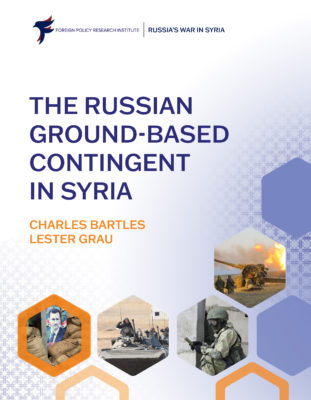A nation must think before it acts.
This report is a part of FPRI’s edited volume Russia’s War in Syria: Assessing Russian Military Capabilities and Lessons Learned.
Introduction
The Syrian Civil War produces a new set of problems involving extended urban combat, intense fights for key resources (oil fields, water, and lines of communication and supply), conventional combat among irregular units, ethnic and religious cleansing, a large number of foreign combatants with varying motivations, and contending outside powers fighting a proxy engagement. The Russian Federation is not an expeditionary power, and its entry into Syria on the side of the regime has strained its logistical resources.
From the beginning of the Syrian campaign, it was clear that Russian involvement was initially envisaged to be through the Russian Aerospace Forces (VKS). Although the Syrian government was on the verge of collapse, and the Syrian military was on its hind legs and a shell of its former self, there was a sufficient number of Syrian ground units that were mission capable. With this understanding, the VKS was to be the principal supplier of Russian combat power aimed at disruption of the command and control and leadership of the groups fighting the Bashar al-Assad regime through the provision of reconnaissance and target destruction. In particular, Russia’s priority was the destruction of the Western-backed, moderate opposition groups, since it saw these as the greatest immediate threat to Assad. The Islamic State (ISIS) and other Sunni extremist groups were targeted, but sat lower on Russia’s priority list.
As with other such operations, «mission creep” soon resulted in Russia’s involvement quickly expanding past the provision of aerospace support to planning, and, in some cases, conducting ground operations. General Valery Gerasimov, Chief of the General Staff of the Armed Forces of Russia, confirmed this expansion of Russian involvement in a December 2017 interview. Russia’s ground-based contingent in the Syrian campaign involves a diverse set of forces and capabilities. Some of the key features of this expanded ground force mission included a Russian model of military advisors, integrated and modernized fires, mobility and countermobility operations, a featured role for military police, use of coastal defense, spetznaz, and private military company (PMC) forces. Russian ground forces have benefitted from the opportunity to provide combat experience to a large number of professional soldiers, conduct battlefield testing of new systems and observe the impact of different terrain on tactics. The forces opposing the Syrian government provide a different opponent than the “enemy” encountered in normal Russian peacetime training and much of the “Syrian experience” is discussed and dissected in Russian professional military journals.
Continue reading the chapter here






